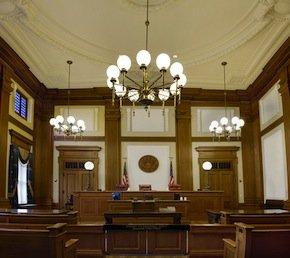of Employees
Employment Law Trials
A trial is one of the final steps in the litigation process. It is your opportunity to try to prove your employment law case and recover damages for your employer’s violations of your rights.
Trial by Judge or Jury

Jury Trial: Most employment law cases have jury trials. At a jury trial a judge rules on legal issues but the jury decides liability (meaning who wins or loses), and determines how much to award you in damages.
Bench Trials: In comparison, in a bench trial there is no jury. Instead, a judge makes all of the rulings and decisions. Certain employment law cases, such as ones involving non-compete agreements and other restrictive covenants, usually have bench trials instead of jury trials.
Phases of a Trial
Although not every trial proceeds the same way, there are certain steps involved in most cases. Some of the key phases of a typical trial are described below.
Jury Selection
In a jury trial, one of the first steps is to select the members of the jury. The potential jurors are asked questions to help the judge and lawyers determine if they can be fair and impartial. The judge may excuse some potential jurors because they are biased. In addition, the lawyers have the right to eliminate a limited number of potential jurors for almost any reason.
Pretrial Motions
At some point before the trial itself begins, the judge will allow the lawyers to make various motions. For example, the lawyers might ask the judge to prevent certain evidence from being used during the trial, or to prohibit a particular fact witness or expert witness from testifying.
Opening Statements
Before the testimony begins, each lawyer has the opportunity to make an opening statement to explain his or her client’s case to the jury. Opening statements are intended to give the jury a preview about what each side expects to prove at the trial. In most employment law cases the employee’s lawyer gives his or her opening statement first.
Testimony and Evidence
The testimony phase of the trial begins after the opening statements. Ordinarily, the employee’s lawyer selects the witnesses to call during the initial portion of the trial, and is the first one to ask questions to those witnesses. Your lawyer will try to prove your employment law case through this testimony and other documents that are put into evidence. When your lawyer is finished with each witness, the employer’s lawyer will have a chance to ask them questions through cross-examination.
Once your lawyer has finished presenting all of your witnesses and evidence, and rests your case, the employer can call its own witnesses and present its own evidence. Your lawyer has the right to cross-examine each of the employer’s witnesses.
In some cases, your lawyer might call additional rebuttal witnesses. If that happens, the employer would have the right to call its own witness to respond to your rebuttal witnesses.
Closing Statements
After all of the testimony and evidence has been presented, the lawyers make their closing statements to the jury. The lawyers summarize the evidence presented during the trial, and try to convince the judge or jury to rule in favor of their clients. In most cases, the employee’s lawyer has the last word by giving the final closing statement.
Jury Charge
In a jury trial, the judge will explain the relevant law to the jury and explain what they have to decide. This is called a jury charge. The judge discusses the wording of the jury charge with the lawyers at some point during the trial, before reading it to the jury.
Deliberations
In a jury trial, the jurors are sent to a private jury room where they will deliberate until they decide how to rule in your case. They decide whether you have met your burden of proof to win your case, and if so, they also decide how much to award you in damages.
In contrast, in a bench trial the judge makes these decisions. Judges often ask the lawyers to submit written arguments after the trial is over, and do not issue their final rulings until after they receive those briefs.
Punitive Damages
If you win your trial, you might be entitled to an opportunity to ask the judge or jury to award you punitive damages as well. Since punitive damages are reserved for the most egregious violations of your employment law rights, they are not necessarily available in every case. Punitive damages are decided at a separate phase of the trial, after you have established your employer’s liability, usually by the same judge or jury.
Post-Trial Motions
After the trial itself is over, it is common for the lawyers to file one or more motions. For instance, your lawyer might file a motion asking your former employer to pay your attorney’s fees and costs or to add prejudgment interest to your award. Likewise, either side could ask the judge to overturn the verdict, or to increase or decrease the amount of the award.
Appeals
After the judge has ruled on the post-trial motions, the parties have the right to file an appeal. More information is available on our employment law appeals page.
Contact Us Today
Rabner Baumgart Ben-Asher & Nirenberg, P.C. represents employees with discrimination, retaliation and other employment law claims, including at trials, in both New Jersey and New York. You can call us at (201) 777-2250 for more information.








